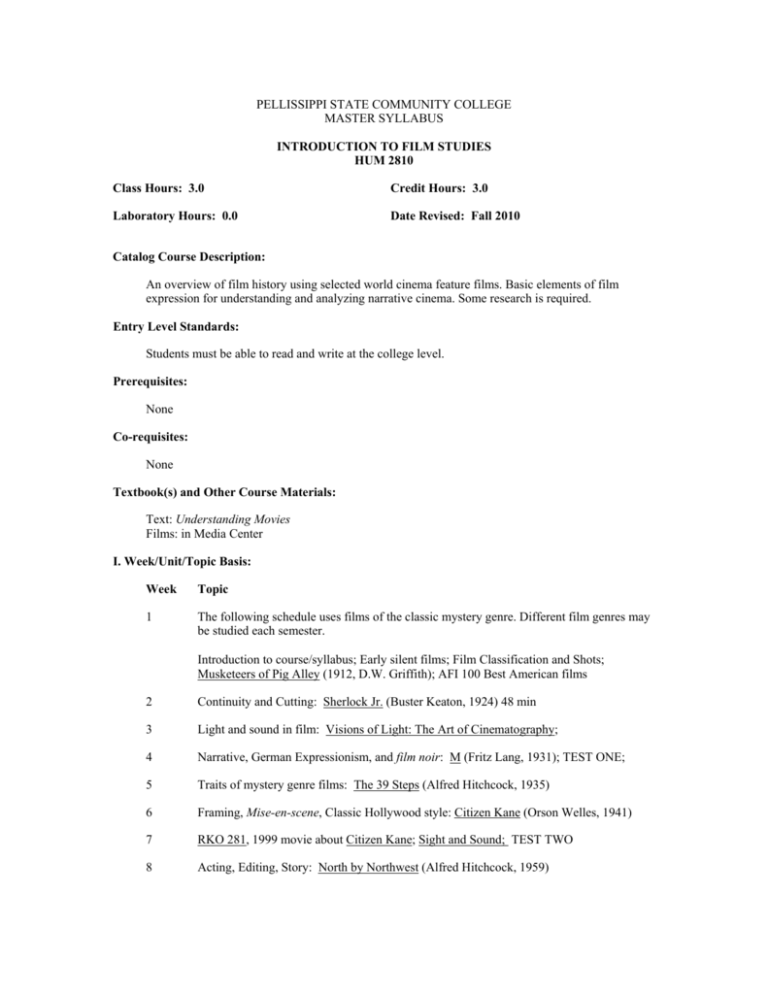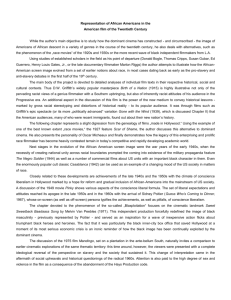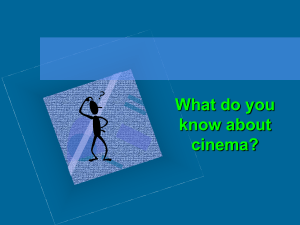HUM 2810 Introduction to Film Studies
advertisement

PELLISSIPPI STATE COMMUNITY COLLEGE MASTER SYLLABUS INTRODUCTION TO FILM STUDIES HUM 2810 Class Hours: 3.0 Credit Hours: 3.0 Laboratory Hours: 0.0 Date Revised: Fall 2010 Catalog Course Description: An overview of film history using selected world cinema feature films. Basic elements of film expression for understanding and analyzing narrative cinema. Some research is required. Entry Level Standards: Students must be able to read and write at the college level. Prerequisites: None Co-requisites: None Textbook(s) and Other Course Materials: Text: Understanding Movies Films: in Media Center I. Week/Unit/Topic Basis: Week Topic 1 The following schedule uses films of the classic mystery genre. Different film genres may be studied each semester. Introduction to course/syllabus; Early silent films; Film Classification and Shots; Musketeers of Pig Alley (1912, D.W. Griffith); AFI 100 Best American films 2 Continuity and Cutting: Sherlock Jr. (Buster Keaton, 1924) 48 min 3 Light and sound in film: Visions of Light: The Art of Cinematography; 4 Narrative, German Expressionism, and film noir: M (Fritz Lang, 1931); TEST ONE; 5 Traits of mystery genre films: The 39 Steps (Alfred Hitchcock, 1935) 6 Framing, Mise-en-scene, Classic Hollywood style: Citizen Kane (Orson Welles, 1941) 7 RKO 281, 1999 movie about Citizen Kane; Sight and Sound; TEST TWO 8 Acting, Editing, Story: North by Northwest (Alfred Hitchcock, 1959) 9 Hollywood in Transition: Reel Radicals 10 American Film Renaissance: In the Heat of the Night (Norman Jewison, 1967) 11 "Literary Adaptations" and Agatha Christie: Murder on the Orient Express (Sidney Lumet, 1974) 12 American film after 1975, CGI: Raiders of the Lost Ark (Stephen Spielberg, 1981) 13 Territorial Space, Proximic Patterns, Psychological Thrillers: Silence of the Lambs (Jonathan Demme, 1991); 14 Ideology and tone in cinema: A la Folie, pas du tout (Laetitia Colombani, 2003); Film Analysis Paper due 15 FINAL EXAM II. Course Goals*: The course will: A. Enhance students’ basic understanding of the historic development of cinema II.1, II.2, II.3, II.6 B. Analyze specific technical aspects of film. II.1, II.6 C. Develop an awareness of the techniques used by filmmakers to emotionally affect film viewers. I.1, II.4 D. Develop an understanding of film as a reflection of cultural values. II.1, II.2, II.3 *Roman numerals after course objectives reference TBR’s General Education Goals (Career Program Goals and General Education Goals are listed http://www.pstcc.edu/departments/curriculum_and_instruction/syllabi/ ) III. Expected Student Learning Outcomes*: Students will be able to: 1. Trace the general development of cinema as an art and as an industry. A 2. Identify characteristics of Hollywood classical films. A 3. Describe the uniqueness of Citizen Kane. A 4. Explain common technical terms used in filmmaking. B 5. Identify common traits of the mystery film genre. B Articulate and support personal opinion with specific reference to a film. B, C 6. Identify techniques used by filmmakers to influence an audience. C Analyze the ideology expressed in one American film. C, D 7. Trace the general development of cinema as an art and as an industry. A 8. Identify characteristics of Hollywood classical films. A * Capital letters after Expected Student Learning Outcomes reference the course goals listed above. IV. Evaluation: A. Testing Procedures: 80% - 90% of grade Test 1 (20%) Test 2 (20%) Test 3 (20%) Test 4/FINAL (20%-30%) [Note: Tests will cover lectures, reading assignments, oral reports, handouts, and films} B. Papers: 10% - 20% of grade Experiments, reports, etc. Laboratory experiments should be tied directly to specific academic activities to reflect theoretical concepts of the course. C. Field Work: ____% of grade Research Paper/Oral Presentation (10%) And/or Analysis paper (10%) If Oral Presentation & paper are not done, final is 30% of grade D. Other Evaluation Methods: N/A E. Grading Scale: 90-100 = A 86-89 = B+ 80-85 = B 76-79 = C+ 70-75 = C 60-69 = D V. Policies: A. Attendance Policy: Pellissippi State expects students to attend all scheduled instructional activities. As a minimum, students in all courses (excluding distance learning courses) must be present for at least 75 percent of their scheduled class and laboratory meetings in order to receive credit for the course. Individual departments/programs/disciplines, with the approval of the vice president of Academic Affairs, may have requirements that are more stringent. In very specific circumstances, an appeal of the policy may be addressed to the head of the department in which the course was taken. If further action is warranted, the appeal may be addressed to the vice president of Academic Affairs. B. Academic Dishonesty: Academic misconduct committed either directly or indirectly by an individual or group is subject to disciplinary action. Prohibited activities include but are not limited to the following practices: • Cheating, including but not limited to unauthorized assistance from material, people, or devices when taking a test, quiz, or examination; writing papers or reports; solving problems; or completing academic assignments. • Plagiarism, including but not limited to paraphrasing, summarizing, or directly quoting published or unpublished work of another person, including online or computerized services, without proper documentation of the original source. • Purchasing or otherwise obtaining prewritten essays, research papers, or materials prepared by another person or agency that sells term papers or other academic materials to be presented as one’s own work. • Taking an exam for another student. • Providing others with information and/or answers regarding exams, quizzes, homework or other classroom assignments unless explicitly authorized by the instructor. • Any of the above occurring within the Web or distance learning environment. C. Accommodations for disabilities: Students who need accommodations because of a disability, have emergency medical information to share, or need special arrangements in case the building must be evacuated should inform the instructor immediately, privately after class or in her or his office. Students must present a current accommodation plan from a staff member in Services for Students with Disabilities (SSWD) in order to receive accommodations in this course. Services for Students with Disabilities may be contacted by going to Goins 127, 132, 134, 135, 131 or by phone: 539-7153 or TTY 694-6429. More information is available at http://www.pstcc.edu/sswd/. D. Other Policies:







